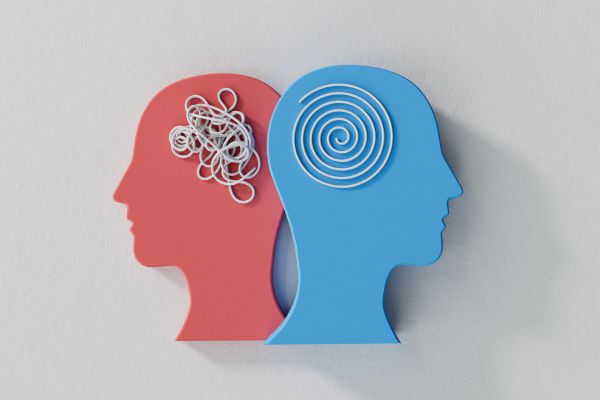Sleep disturbances are a common symptom of dementia, a devastating cognitive disorder. More recent studies are beginning to shed light on the intricate connections between poor sleep in early life and dementia in later years. This article dives into the innovative work that investigates the link between chronic sleep loss and the development of dementia. Our goal in studying this correlation is to understand better how sleep contributes to brain health and, by extension, how it may be used to reduce the chance of developing dementia.
Contents
Understanding Lack of Sleep and Dementia
Dementia, particularly Alzheimer’s disease, is characterized by a change in sleep habits that is both prevalent and puzzling. People with these illnesses generally have trouble falling asleep, severely disrupting their circadian rhythm. This disturbance is not only a symptom of dementia; there is growing evidence to show it contributes to the progression of the illness.
 There has been a lot of study done on the complicated connection between sleep disruptions and dementia. Dr. Séverine Sabia and her colleagues at Inserm and University College London conducted seminal research to illuminate this link. Their study, published in Nature Communications and partly supported by the NIH’s National Institute on Aging (NIA), examines the relationship between sleep habits and cognitive decline across time.
There has been a lot of study done on the complicated connection between sleep disruptions and dementia. Dr. Séverine Sabia and her colleagues at Inserm and University College London conducted seminal research to illuminate this link. Their study, published in Nature Communications and partly supported by the NIH’s National Institute on Aging (NIA), examines the relationship between sleep habits and cognitive decline across time.
This research studied over 8,000 British adults beginning at the age of 50. Over the years, individuals reported their sleep duration, complemented by objective data using accelerometers in certain situations. Surprisingly, 521 people in the research were diagnosed with dementia, most often around age 77.
 One of the most important takeaways from this study is the increased risk of dementia among those in their 50s and 60s who regularly get fewer than six hours of sleep. These people had a 30% higher chance of acquiring dementia compared to those who slept an average of seven hours each night. This correlation remained even after accounting for lifestyle choices, BMI, and preexisting medical disorders, including diabetes and heart disease, all of which are known to affect sleep or dementia risk.
One of the most important takeaways from this study is the increased risk of dementia among those in their 50s and 60s who regularly get fewer than six hours of sleep. These people had a 30% higher chance of acquiring dementia compared to those who slept an average of seven hours each night. This correlation remained even after accounting for lifestyle choices, BMI, and preexisting medical disorders, including diabetes and heart disease, all of which are known to affect sleep or dementia risk.
These results provide light on the possibility for midlife sleep habits to be a modifiable risk factor for dementia. The link between the two conditions highlights the need for further study since it is still unclear whether sleep difficulties cause dementia or are an early sign. The significance of establishing good sleep patterns at a young age cannot be overstated, and understanding this connection might lead to new paths for dementia preventive measures.
Role of Deep Sleep in Brain Health
The slow-wave brain activity associated with deep sleep is crucial to optimal health and mental performance. Memory consolidation occurs during this stage of sleep when the brain analyzes and stabilizes new information learned throughout the day. Thus, disruptions in deep sleep greatly impact memory recall and cognitive functions.
 Consistent evidence from studies has indicated that deep sleep is necessary for brain plasticity, the process by which the brain may restructure and repair itself. This restoration is essential for learning, memory, and executive function. In dementia, the degradation of deep sleep quality might contribute to cognitive impairment. As the brain loses its ability to enter and sustain deep sleep, memory consolidation, and mental processing capacity weaken.
Consistent evidence from studies has indicated that deep sleep is necessary for brain plasticity, the process by which the brain may restructure and repair itself. This restoration is essential for learning, memory, and executive function. In dementia, the degradation of deep sleep quality might contribute to cognitive impairment. As the brain loses its ability to enter and sustain deep sleep, memory consolidation, and mental processing capacity weaken.
Multiple studies have shown a higher correlation between poor deep sleep and dementia. Alzheimer’s disease-associated beta-amyloid protein, for example, has been related to diminished slow-wave sleep. This buildup may exacerbate sleep disruption, leading to a self-perpetuating cycle of cognitive impairment.
 Furthermore, deep sleep’s recuperative benefits go beyond only helping with memory. The brain detoxifies and eliminates metabolic byproducts during deep sleep. Inadequate deep sleep may increase the risk of neurodegenerative illnesses like dementia by interfering with the removal of neurotoxic chemicals, including beta-amyloid.
Furthermore, deep sleep’s recuperative benefits go beyond only helping with memory. The brain detoxifies and eliminates metabolic byproducts during deep sleep. Inadequate deep sleep may increase the risk of neurodegenerative illnesses like dementia by interfering with the removal of neurotoxic chemicals, including beta-amyloid.
These results highlight the importance of deep sleep quality in protecting brain function and lowering the probability of developing dementia. Improving the quality of deep sleep may help delay or stop the onset of cognitive deterioration. This underscores the need for further investigation into therapies that might increase the quantity and quality of deep sleep, particularly in middle-aged and older persons, to reduce the risk of dementia and maintain cognitive health.
Midlife Sleep and Dementia Link
Dr. Séverine Sabia’s research team found a strong link between how long you slept in middle age and your likelihood of acquiring dementia. An important finding from this landmark longitudinal study—which followed the sleeping habits of nearly 8,000 people in their 50s and 60s—was that people who regularly slept for six hours or less reduced the risks than those who slept for seven hours.
This discovery is especially important since it changes attention from sleep disruptions only in old age to those that begin in midlife. It implies that sleep habits in one’s 50s and 60s may have a significant role in the development of dementia decades later. Dementia studies have often focused on the elderly; hence, this demographic gap exists.
The research took into consideration all potential influences on sleep and dementia risk. Lifestyle factors, BMI, and diseases, including diabetes and heart disease, were also mentioned. Despite taking these factors into account, a strong correlation was still found between low sleep duration in midlife and an elevated risk of dementia.
 Importantly, this study took into account mental health issues, including depression, which is strongly associated with nocturnal awakenings. The research helps clarify the direct link between sleep and dementia risk, apart from psychiatric conditions, by isolating these confounding variables.
Importantly, this study took into account mental health issues, including depression, which is strongly associated with nocturnal awakenings. The research helps clarify the direct link between sleep and dementia risk, apart from psychiatric conditions, by isolating these confounding variables.
The research doesn’t prove a cause-and-effect link, but it does bolster the case that midlife sleep length is a major contributor to dementia risk. This understanding may lead to novel prevention measures. People may lower their chances of having dementia in old age if they make getting enough sleep a priority in their midlife.
This study underlines the need for a larger public health emphasis on sleep quality throughout life, especially in midlife, as a possible strategy for lowering dementia risk. It also advocates for greater study to untangle the complicated pathways between sleep and cognitive impairment.
Practical Tips for Enhancing Sleep Quality
There are several easy things you can do to get better sleep, which is important for your brain’s health and could even lower your chance of developing dementia. Setting a regular bedtime helps keep the body’s internal clock in sync, and ensuring your bedroom is dark, quiet, and cold also improves your sleep quality. Because blue light from screens may prevent the body from producing melatonin, limiting their use in the hours leading up to sleep is recommended. Even while regular exercise helps you sleep better, you shouldn’t do it too close to bedtime, or you can keep yourself awake.
The quality of your sleep may be enhanced by making dietary changes, such as avoiding large meals, coffee, and alcohol. Reading or meditating before bedtime sends a calming message to the brain and body. A specialist may provide individualized guidance and therapy for sleep problems, while stress management practices like deep breathing or yoga can assist. Together, these strategies can greatly improve sleep quality, lowering the chance of developing dementia.
Broader Implications of Sleep on Cognitive Health
Beyond the danger of dementia, sleep has far-reaching ramifications for cognitive health. A good night’s sleep is essential for several cognitive processes. The brain performs critical activities necessary for memory consolidation and mental restoration during sleep, especially in deep rest periods. Sleep’s ability to restore cognitive function is essential for effective daily functioning and maintaining high mental sharpness levels. In addition, sleep is crucial for maintaining a healthy mental state and regulating emotions.
Mood disorders, anxiety, and a lack of emotional resilience may all affect cognitive health if they are allowed to persist due to chronic sleep deprivation or poor sleep quality. The beta-amyloid plaques linked to Alzheimer’s disease are cleared out of the brain during sleep, along with other poisons and metabolic waste. This cleaning process shows that excellent sleep hygiene could be a preventive factor against accumulating chemicals that lead to cognitive deterioration.
The research by Dr. Séverine Sabia and colleagues shows the relevance of sleep length in midlife as a possible modifiable risk factor for dementia, hence underlining the need for public health measures that stress the value of sleep across all ages.
Conclusion
Research into the complex relationship between sleep quality and cognitive function, and in particular the risk of dementia, is gaining momentum. Studies like the one by Dr. Séverine Sabia’s team show that getting enough sleep is important at any age, particularly in middle age, when it may help stave off cognitive deterioration. Restful sleeping habits are essential for your long-term mental and physical health, so you shouldn’t see it as just a way to recharge your batteries. The importance of sleep is becoming more recognized and acknowledged by scientists.




